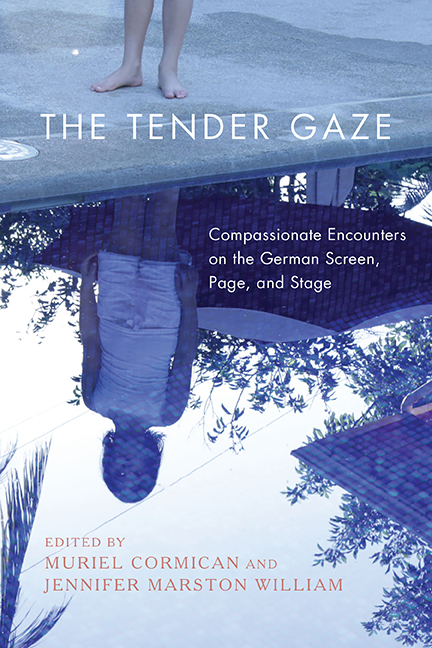Book contents
- Frontmatter
- Contents
- Acknowledgments
- Introduction: The Tender Gaze
- 1 Toward a Theory of the Tender Gaze: Affect, Critical Insight, and Empathy in Contemporary German Cinema
- 2 The Tender Gaze, Embodied Politics, and Perspective-Taking in German Postdramatic Theater
- 3 Face to Face: Race, Gender, and the Gaze in Mo Asumang’s Die Arier
- 4 “Risse, hinter denen man einen Kern entdeckt, der so ähnlich ist wie die Herzen von uns allen”: The Tender Gaze in Umut Dağ’s Risse im Beton
- 5 Looking through the Eyes of Empathy: Encouraging a Culture of Caring and Compassion in Doris Dörrie’s Keiner liebt mich
- 6 The Tender and Transgressive Beast Within: Escape Narratives in Films by Krebitz, Stuber, and Speckenbach
- 7 Looking at Looking in Margarethe von Trotta’s Das Versprechen
- 8 A Queer Phenomenology of Gender in Maren Ade’s Alle Anderen and Toni Erdmann
- 9 Rilke’s “Schauen”
- 10 Pity Stares or Tender Gaze? Seeing Disability in Nineteenth-Century Austrian and German Literature
- 11 The Sociohistorical and Gendered Implications of Gazing Tenderly in Ludwig Tieck’s “Liebeszauber”
- 12 Mothering, Animals, and the Surveillance State in the Anthropocene: An Ecofeminist Reading of Birgit Vanderbeke’s Die Frau mit dem Hund
- Notes on the Contributors
- Index
10 - Pity Stares or Tender Gaze? Seeing Disability in Nineteenth-Century Austrian and German Literature
Published online by Cambridge University Press: 05 October 2022
- Frontmatter
- Contents
- Acknowledgments
- Introduction: The Tender Gaze
- 1 Toward a Theory of the Tender Gaze: Affect, Critical Insight, and Empathy in Contemporary German Cinema
- 2 The Tender Gaze, Embodied Politics, and Perspective-Taking in German Postdramatic Theater
- 3 Face to Face: Race, Gender, and the Gaze in Mo Asumang’s Die Arier
- 4 “Risse, hinter denen man einen Kern entdeckt, der so ähnlich ist wie die Herzen von uns allen”: The Tender Gaze in Umut Dağ’s Risse im Beton
- 5 Looking through the Eyes of Empathy: Encouraging a Culture of Caring and Compassion in Doris Dörrie’s Keiner liebt mich
- 6 The Tender and Transgressive Beast Within: Escape Narratives in Films by Krebitz, Stuber, and Speckenbach
- 7 Looking at Looking in Margarethe von Trotta’s Das Versprechen
- 8 A Queer Phenomenology of Gender in Maren Ade’s Alle Anderen and Toni Erdmann
- 9 Rilke’s “Schauen”
- 10 Pity Stares or Tender Gaze? Seeing Disability in Nineteenth-Century Austrian and German Literature
- 11 The Sociohistorical and Gendered Implications of Gazing Tenderly in Ludwig Tieck’s “Liebeszauber”
- 12 Mothering, Animals, and the Surveillance State in the Anthropocene: An Ecofeminist Reading of Birgit Vanderbeke’s Die Frau mit dem Hund
- Notes on the Contributors
- Index
Summary
HAVING A DISABILITY in many cases means being hyper-visible. When people are confronted with someone whose appearance and/or body defies their expectations, looking, watching, or staring is often their first response. Being the object of other people's visual curiosity and not having the opportunity to remain unnoticed in a crowd is a constant part of the lived experience of many disabled people. These recurring moments of visual assessment and exposure can be oppressive and reinforce interpersonal hierarchies to the disadvantage of the person with disabilities. But seeing disability can also entail a radical potential to change worldviews and to create understanding and recognition.
In the following, I analyze visual encounters between disabled people and the non-disabled within nineteenth-century literary texts and examine how or if they mobilize a tender gaze. Muriel Cormican has defined the tender gaze as one that “does not condescend or reify.” A tender gaze takes into account the individuality and complexity of another person. It involves a way of seeing that is premised on empathy and understanding. Analyzing occurrences of the tender gaze in connection with fictional characters with disabilities highlights moments when they are recognized as complex individuals with desires, ideas, merits, but also flaws. A tender gaze does not judge prematurely or reinforce preestablished social hierarchies but recognizes and affirms the other person's humanity and individuality.
One of the main goals of Disability Studies is to show that disabled people are not inherently worse off but instead form part of a wide spectrum of human variability, where each position comes with its own awareness and insight. Disability Studies as an academic discipline is heavily grounded in the disability rights movement from which it developed, and therefore aims to affirm disabled people's agency and refuses to treat them as case studies or research objects. Part of this agenda is looking at cultural representations of disability and analyzing the dynamic between disability, ideology, norms, and society. The tender gaze is often evident in textual instances where people with disability are not objectified, disregarded, or denigrated, but valued for who they are.
- Type
- Chapter
- Information
- The Tender GazeCompassionate Encounters on the German Screen, Page, and Stage, pp. 177 - 193Publisher: Boydell & BrewerPrint publication year: 2021



